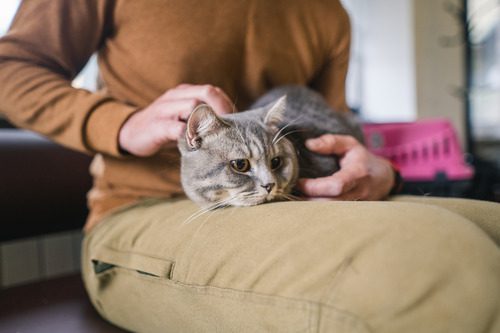Seeing blood in your cat’s vomit is alarming and raises immediate concern. If you’ve found yourself asking, “My cat is vomiting blood, what do I do?”, this blog can help. While this symptom can point to a range of health conditions, some mild and others more serious, it’s always a sign that your cat needs veterinary attention. Below, we’ll discuss the potential causes, what to watch for, and what steps to take next. If you’re in the Fort Lauderdale area and notice your cat vomiting blood, call Central Broward Animal Hospital at (954) 792-6223 to schedule an evaluation.

What It Means When You Notice Blood in Your Cat’s Vomit
Vomiting blood, known as hematemesis, is not a diagnosis but a symptom. It often signals an underlying condition that requires medical evaluation. The blood may appear bright red, indicating fresh bleeding, or it may look like coffee grounds, which suggests older blood that’s been partially digested. In any case, noticing your cat is vomiting blood is not something to ignore. Even if your cat seems otherwise fine, a physical exam and diagnostic testing are needed to uncover the cause. Cats are experts at hiding pain, so outward signs of illness may not match the severity of the condition.
Fresh vs. Digested Blood
The color and texture of the blood can give your veterinarian important clues. Bright red blood may suggest bleeding in the mouth, esophagus, or upper stomach. Dark, grainy blood could indicate slow or prolonged bleeding from the stomach or small intestine. When speaking with your vet, describe what you saw in as much detail as possible, or take a photo to show during the visit.
Potential Reasons Why Your Cat May Be Vomiting Blood
Vomiting blood can result from a wide range of causes, some more urgent than others. Here are several of the most common reasons veterinarians evaluate when a cat presents with this symptom.
Gastrointestinal Irritation or Ulcers
The lining of your cat’s stomach and intestines can become irritated or ulcerated due to a number of issues, including infections, medications, or chronic vomiting. Inflammation or ulceration can lead to small tears in the mucosal lining, allowing blood to mix with stomach contents. Medications like non-steroidal anti-inflammatories (NSAIDs) or corticosteroids, if given long-term or at high doses, may contribute to gastrointestinal injury. Always follow your veterinarian’s instructions and never administer human medications to your cat.
Ingesting a Foreign Object
If a cat eats something that doesn’t belong in their digestive system such as string, ribbon, rubber bands, or pieces of toys, it can irritate or damage the gastrointestinal lining. In some cases, sharp or abrasive items may cut the tissue and cause bleeding. Blockages from foreign objects can also result in vomiting, sometimes with blood.
Poisoning or Toxin Exposure
Certain toxins can damage the digestive tract or lead to internal bleeding. Rodenticide ingestion, for example, can cause internal bleeding and should always be considered a medical emergency. Household cleaners, plants, or medications that are toxic to cats may also cause vomiting blood. If you suspect your cat ingested something toxic, contact your vet or an emergency clinic immediately. You can also call the ASPCA Animal Poison Control Center at (888) 426-4435.
Trauma or Injury
Blunt force trauma such as a fall, car accident, or other physical injury may result in internal damage and bleeding. Even if there are no visible signs of injury, internal bleeding could cause vomiting blood. If your cat recently experienced a traumatic event and is now vomiting blood, seek veterinary attention right away.
Tumors or Cancer
Cats can develop benign or malignant tumors within their digestive system, especially as they age. Tumors can disrupt the normal lining of the stomach or intestines and lead to ulceration or bleeding. If my cat is vomiting blood and weight loss or appetite changes are also present, your veterinarian may recommend imaging or biopsies to investigate further.
Blood-Clotting Disorders
Some health conditions interfere with your cat’s ability to form normal blood clots. This can result in spontaneous bleeding in various parts of the body, including the gastrointestinal tract. Clotting disorders may be inherited or acquired due to illness or toxin exposure.
Symptoms That Often Accompany Vomiting Blood in Cats
When pet owners ask, “My cat is vomiting blood, what do I do?” they’re often also seeing other signs that something isn’t right. These accompanying symptoms can help your vet determine the cause and urgency of the issue:
- Loss of appetite
- Lethargy or weakness
- Pale gums
- Abdominal pain or sensitivity
- Diarrhea or black, tarry stools (which may indicate digested blood)
- Dehydration or sunken eyes
Even if blood appears just once, it’s best to err on the side of caution. Multiple episodes or worsening symptoms indicate a higher level of urgency.
How We Investigate Blood in Vomit
To pinpoint the underlying cause of vomiting blood, your veterinarian at Central Broward Animal Hospital will begin with a physical exam and then recommend appropriate diagnostic tests.
Common Diagnostic Tools
- Bloodwork to assess organ function, red blood cell count, and clotting ability
- Fecal testing to check for parasites or infection
- X-rays or ultrasound to look for obstructions, tumors, or internal injuries
These tests help your veterinarian understand what’s going on internally and guide next steps for care. Diagnosing the reason my cat is vomiting blood can take time, but each test provides valuable information.
How Fast Action Can Make a Difference in Your Pet’s Health
Waiting to see if symptoms resolve on their own can put your cat at greater risk. Vomiting blood may reflect internal bleeding, infection, or other issues that worsen without treatment. Additionally, repeated vomiting can lead to dehydration and nutrient loss, which can further impact your cat’s health. Even if the issue turns out to be mild, prompt attention allows for faster recovery and peace of mind. Central Broward Animal Hospital in Fort Lauderdale is equipped to provide advanced diagnostic care and supportive treatment when your cat needs it most. You can call (954) 792-6223 to make an appointment.
Tailoring Treatment Options Based on the Underlying Cause
There is no one-size-fits-all solution when it comes to treating a cat who is vomiting blood. Once the underlying issue is identified, your veterinarian will outline a treatment plan tailored to your cat’s needs.
Supportive Care
Supportive treatment may include IV fluids to address dehydration, anti-nausea medications, pain relief, and nutritional support. In cases involving ulcers or inflammation, medication may be prescribed to protect the stomach lining and reduce acid production.
More Advanced Care
Surgical intervention may be necessary if your cat has a foreign body obstruction or a mass that requires removal. Cats with toxin exposure or clotting disorders may need hospitalization and intensive monitoring. The sooner treatment begins, the better the chances of a positive outcome.
How You Can Help Your Veterinarian Help Your Cat
When bringing your cat to the vet, try to provide detailed information that can help guide the evaluation process. If your cat vomited something unusual, take a photo of the vomit or bring a sample. Share any recent changes in behavior, appetite, or environment, and let your veterinarian know if your cat could have been exposed to any medications, plants, or household chemicals. This information can make a significant difference in helping your veterinarian determine the cause behind why my cat is vomiting blood and how to proceed with treatment.
When It’s Time to Call for Help
Vomiting blood is never considered normal in cats. Whether it’s a one-time incident or part of a pattern of concerning symptoms, don’t wait to see if things improve on their own. Early intervention can prevent complications and improve outcomes. If you’re in the Fort Lauderdale area and you notice that my cat is vomiting blood applies to your situation, call Central Broward Animal Hospital today at (954) 792-6223 to schedule an urgent appointment. Our team is here to support you and your cat with compassionate, expert veterinary care.
